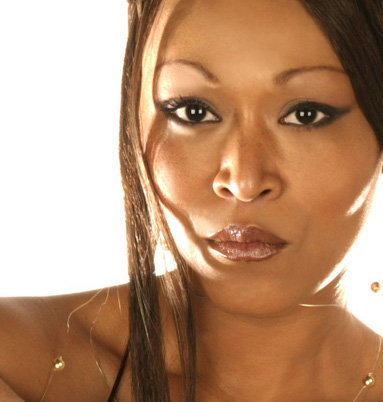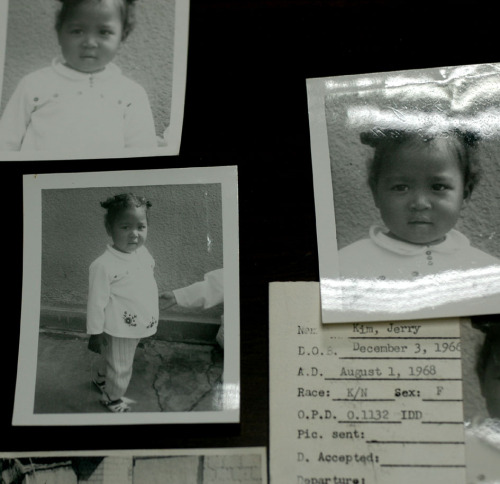
Singer’s search to find family takes her through emotional journey around the world
Three months ago, Metta Carter knew next to nothing about her Korean heritage.
All she had was her memory of an old black and white picture of a woman in hanbok that she lost when she was 23 years old. It was her mother.
“And she was sitting in one of these hanbok, with her hair tall, like this, really tall,” she said, her eyes twinkling as she motioned with her hands. “It was so beautiful. A very special picture.”
The organization she’s working with to track down her mother calls her Jerry Kim, the name given to her by her mother, which she discovered was actually a unisex name given to the children of American soldiers.
But the soul-rock singer from Denmark soon began to put the pieces together as little things began happening, leading her here to Seoul, in her words, “like many little rivers.”
Three months ago, a boyfriend of Carter’s first started “guiding” her toward being more open about and interested in searching for her family. She met Koreans in Denmark who told her that her family line, Andong, was an old aristocratic bloodline, and one of the oldest clans.
But Carter’s search for her mother hasn’t been easy.
The singer, whose father was an American soldier, said that she could not find much information until her arrival in Seoul. She has been staying at KoRoot, an organization for Korean adoptees.
On Monday afternoon, she was able to look at her files that were transferred to a medical center after the Seoul Sanitarium and Hospital Orphanage closed in the mid-1970s.
Three months ago, Metta Carter knew next to nothing about her Korean heritage.
All she had was her memory of an old black and white picture of a woman in hanbok that she lost when she was 23 years old. It was her mother.
“And she was sitting in one of these hanbok, with her hair tall, like this, really tall,” she said, her eyes twinkling as she motioned with her hands. “It was so beautiful. A very special picture.”
The organization she’s working with to track down her mother calls her Jerry Kim, the name given to her by her mother, which she discovered was actually a unisex name given to the children of American soldiers.
But the soul-rock singer from Denmark soon began to put the pieces together as little things began happening, leading her here to Seoul, in her words, “like many little rivers.”
Three months ago, a boyfriend of Carter’s first started “guiding” her toward being more open about and interested in searching for her family. She met Koreans in Denmark who told her that her family line, Andong, was an old aristocratic bloodline, and one of the oldest clans.
But Carter’s search for her mother hasn’t been easy.
The singer, whose father was an American soldier, said that she could not find much information until her arrival in Seoul. She has been staying at KoRoot, an organization for Korean adoptees.
On Monday afternoon, she was able to look at her files that were transferred to a medical center after the Seoul Sanitarium and Hospital Orphanage closed in the mid-1970s.


She stayed there until she was adopted in 1969.
It in were pictures of Carter, her mother and her father, whom she had never even seen a picture of efore, and the personal information of her mother. She said KoRoot will use this information to continue the search.
“I came out here to get some sort of delivery from feeling pain,” she said. “And I could put a sentence in here. Like maybe a rock and roll sentence, that there’s a hole in my heart and I don’t know how to fix it:
that is the core of every adoptee.”
Despite dealing with her feelings of pain and rejection after being adopted out of a country, Carter describes herself as a free spirit and has enjoyed her time spent in Korea so far, singing at open mics
and churches, rather than sitting at home and crying.
“Coming out here, I decided to take it easy. Sing. And stay true to who I am,” she said. “I dealt with it already.”
Looking at Carter’s past, it seems as though everything worked together to mold her into who she is today, a multi-artist and human rights activist who has worked with the likes of Jacob Holdt, the Danish human rights photographer.
She sings Jimi Hendrix and is arranging a concert to celebrate Holdt’s 65th birthday when she returns to Copenhagen. She said all the debaters and actors in the human rights battle in Denmark will be there, and describes the concert as “the biggest step” she’s made in her music. She is planning to perform Jimi Hendrix with a band, Son of Mad, and her own song “Promise of Love,” which she composed while traveling and doing concerts with Holdt.
Carter was adopted into a family of creative people — musicians, artists, history teachers, Danish eachers, English teachers.
“I was very lucky to get into an environment that nurtures that aspect of creativity. So in that way I turned out to be a multi-artist.”
But it wasn’t easy. Carter said while her family nurtured her creative side, it was difficult for them to connect with her roots. She said at three she was forced to realize she was alone, that she wasn’t like anyone else in her family. But it forced to her to learn how to love.
“I was forced for basic survival to love other people regardless that they didn’t look like me, they didn’t speak like me,” she said. “If you’re forced to do that, you realize what universal love is. And you realize that love is something beyond culture, beyond race, beyond nationality, beyond gender. Everything.”
Her journey through life and searching for her mother helped her become who she is today. She said it’s a journey she had to take herself, and that it brought her to a place where she is who she is. A place where there are no doubts, no fears. A place where she is just herself and not pretending to be any else.
“That’s kind of the aim with my music. And then sharing. Loving. Going to a feeling of love,” she said. And while Carter is leaving on Thursday morning, she hopes to come back to Korea and get more involved with single mothers. She said that the lack of support for mothers to keep their children, only to put them up for adoption, is one of Korea’s drawbacks.
Carter herself has been a single mom for 19 years, but she says the difference between Denmark and Korea is that in Denmark, any single parent, whether mother or father, can receive support, both economically and morally.
“I can’t even understand how society could treat people like this,” she said. “It’s fundamental. It’s the biggest joy that you’re going to have in your life: a child. How could you deprive any woman from having that experience? It’s inhuman.”
Carter is hoping to do a charity concert or exhibition in the future to bring more light to the situation.
“If I can move even a little something while being here, that would be the issues of the single moms.
Because that’s in resonance to my own life,” she said.
(ekalka@heraldcorp.com)
-
Articles by Korea Herald



















![[Today’s K-pop] Le Sserafim garners 100m views with ‘Eve’ music video](http://res.heraldm.com/phpwas/restmb_idxmake.php?idx=642&simg=/content/image/2024/05/24/20240524050572_0.jpg&u=)